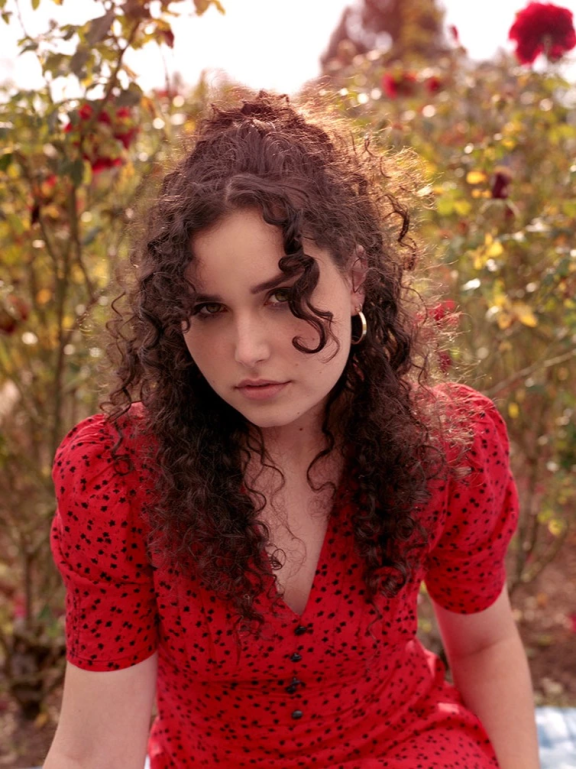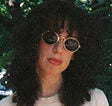Mental illness is complicated, but not talking about it doesn’t make it less so. Part of our mission is to help people feel better, both physically and mentally, and while CBD can help, there are many tools you can lean on for support. Mental Health Memos is a series that delves into the importance of destigmatizing mental illness and shines a light on those who are using their voice to bring these conversations to front and center.
If you don’t know the name Julia Hava, you sure as hell know the memes. Hava’s Instagram account, Binch City, is a viral fixture. But your average meme account it is not.
Hava’s gifts are manifold. From making artful digital collages that resemble the double standards-laden women’s magazine ads of last century (which upon closer inspection reveal satirically culture-jammed messages about sexism, self-care, and psychiatric meds), to co-hosting her podcast Binchtopia alongside Eliza McLamb, to curating an audience of thousands via a seminar-rich Patreon platform, a Discord server, and more. Self-identified ‘binches’ can even wear their allegiance in the form of cute merchandise.
But despite Hava’s range, all roads lead back to genuine community for the LA-based creator. It was her own struggles with mental health that led her to reach out for connection and camaraderie on social media to begin with. And it’s been the army of like-minded young people she’s attracted that has helped heal and restore her self-expression and sense of purpose. And in 2021, any community that fosters real-world relationships and frank discussions about depression, anxiety, healing, and self-growth in a broken culture—let alone one that’s exceeded six digits of followers and counting—is nothing to scoff at.
We caught up with Julia Hava to discuss the highs and lows of a life lived publicly, mental health in the age of COVID, and the importance of shame-free dialogue.
When I was a sophomore in college I was struggling with depression and felt really isolated and disconnected. I’ve always loved memes and internet humor so I started making memes anonymously about my feelings and experiences and people started to relate. I’ve always been someone who expresses myself creatively when I’m struggling. Throughout the years, I started to teach myself photoshop and learn more about graphic design which helped me express myself more artistically.
One of my favorite things about being a creator is being able to convey universal sentiments that people can relate to. I talk a lot about sexism and bad dating experiences, which I think is relatable because so many women have had the same terrible and sometimes hilarious experiences with men. In general, I think a lot of women and femmes have struggled with their mental health, especially during the pandemic, and I think being open about that and talking about it honestly draws people to my page. I also have a background in history and psychology so I like to add an intellectual context to much of what I talk about. Plus, I’ve just been to a lot of therapy, so I have a lot to say!


I’ve been taking psychiatric medication for almost ten years, so it’s very normal to me. I think psych meds can offer amazing benefits to people; they can help make you more functional and generally make your life easier. But I’ve also talked a lot with my following about how in our society, meds are often given to people too quickly or as the only option. Meds have been really helpful to me, but I went to therapy first, and therapy has helped me learn the most about myself and made the biggest difference in my life. Meds help me feel more stable, but they’re definitely not a magic bullet or an excuse to not work through your own trauma.
COVID has been really difficult for me as I know it’s been for so many people. I’ve had anxiety for as long as I can remember, but my anxiety got so much worse during COVID. Often, I’ve just felt completely paralyzed and unable to do anything. For a lot of the pandemic I’ve just focused on getting through the day. I was home with my family for around six months at the beginning of the pandemic, which was helpful in many ways, but I also didn’t feel like I got to be my adult self and grow the way I was supposed to.
When I came back to LA, I felt better in that I was able to live independently and felt like an adult again. After returning, I also met some great new friends, began dating my wonderful boyfriend, and started my podcast, Binchtopia. So, in some ways this time has been healing for me. However, I think we as a society need to acknowledge how traumatizing this time has been for everyone. We’re going to need to join together as a collective to really work through all of this. As much as everyone wants to immediately go back to normal, I think it’s unwise and also unfair to deny ourselves the catharsis and processing of grief that living through a global pandemic requires.
I will admit that during most of COVID I basically had no self-care or wellness routine besides eating whatever gave me the most dopamine. However, I’ve recently gotten back into exercising and doing spin classes which has made a big difference for me. I like to do it around 4-5 times a week and although I hate to admit that the wellness gurus were right, it does actually make a difference in my mental health. I also like to journal when I’m feeling down, even if it’s just my stream of consciousness. Also, for most of the last 18 months, I’ve been talking to my therapist twice a week which was immensely helpful when I was struggling.
The community I’ve built with my platform is what’s most important to me. Sometimes when I’m feeling down, I’ll post a question sticker on my story like “how is everyone feeling today?” When I get an influx of responses from people it really does make me feel like we’re in a group therapy session and all sharing our experiences together. I think there is so much value in realizing that you’re not alone in the way that you’re feeling: other people are almost certainly feeling the exact same way as you in that exact moment.
At the beginning of COVID I was also doing some movie screenings with my followers where we’d all Netflix Party [Teleparty] the worst romantic comedies on Netflix and I think it gave us all a wonderful respite from the anxiety of COVID. With my podcast, a lot of my followers have become listeners which has made me so happy because we’re continuing to build that community in a different and more expansive way.

That’s a hard question, but I guess I’d say “Better Distractions” by Faye Webster just because of the first couple lines: “Sit around until I find something better to spend my time / But nothing is appealing.” That feels pretty relevant to COVID life.

